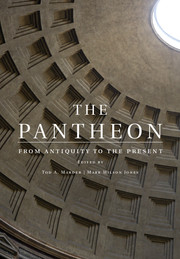
- Publisher:
- Cambridge University Press
- Online publication date:
- June 2015
- Print publication year:
- 2015
- Online ISBN:
- 9781139015974
- Subjects:
- Classical Studies, Art, Architecture, Classical Art and Architecture

The Pantheon is one of the most important architectural monuments of all time. Thought to have been built by Emperor Hadrian in approximately AD 125 on the site of an earlier, Agrippan-era monument, it brilliantly displays the spatial pyrotechnics emblematic of Roman architecture and engineering. The Pantheon gives an up-to-date account of recent research on the best preserved building in the corpus of ancient Roman architecture from the time of its construction to the twenty-first century. Each chapter addresses a specific fundamental issue or period pertaining to the building; together, the essays in this volume shed light on all aspects of the Pantheon's creation, and establish the importance of the history of the building to an understanding of its ancient fabric and heritage, its present state, and its special role in the survival and evolution of ancient architecture in modern Rome.
Winner, 2016 PROSE Award for Classics
'The contributors provide a valuable synthesis of recent research on the Pantheon, the paradigm of Roman architectural and engineering prowess. They also identify new and productive directions for subsequent research on the ancient edifice and on its extended legacy.'
John Pinto - Princeton University, New Jersey
'For two thousand years, the Pantheon has stood watch in the center of Rome, a marvel of engineering and an unfailingly mysterious symbol. Both the marvel and the mystery shine forth from this definitive book, with its impeccable scholarship, new ideas, and long international perspective.'
Ingrid Rowland - University of Notre Dame, Indiana
'Focused on the Pantheon, arguably the most iconic building of western architecture, this magisterial volume brings together a distinguished group of international scholars who tell a gripping story. New answers to unsolved questions of who built it and why, how, and when succeed each other and connect to lively accounts of the fascination it held for countless generations from the early Middle Ages to modern times.'
Alina Payne - Harvard University, Massachusetts
 Loading metrics...
Loading metrics...
* Views captured on Cambridge Core between #date#. This data will be updated every 24 hours.
Usage data cannot currently be displayed.